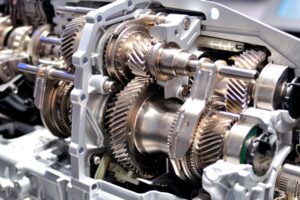Being in production since 1983, the Toyota 4Runner is a mid-size sport utility vehicle that has amassed quite a solid reputation.
It is known for its ruggedness, durability, and off-road capabilities. It also has a reliable reputation and a strong resale value.
Despite these positive points, people often bring up the Toyota 4Runner transmission problems.
The lineup has had its ups and downs, which is why not every model is inherently bad.
That being said, certain models are prone to a wide range of issues that deserve to be discussed.
Here are all the issues that you can encounter when dealing with the Toyota 4Runner:
- Gear Slippage
- A Burning Smell
- No 1st Or 2nd Gear
- No 3rd Or 4th Gear
- Low Transmission Fluid
- Clunking Or Humming Noises
- Transmission Fluid Leaks
- Torque Converter Issues
- Valve Body Issues
- Bad Shift Solenoid
All of these problems have their causes and effects on the car. If you want to learn more about them and figure out which models are common, you should read this article until the end.
Table of Contents
10 Signs Of Transmission Problems In A Toyota 4Runner

There are a ton of issues that you can face in the Toyota 4Runner when it comes to the transmission.
Unfortunately, not all of them are as easily noticeable as hoped.
Some require better observation, whereas others are more obvious.
Here are all the signs of transmission problems explained in the Toyota 4Runner.
1. Gear Slippage
Gear slippage can cause the car to feel unstable and can be dangerous to drive. It occurs when the transmission cannot provide enough power to the wheels to move the vehicle.
This can happen when the transmission is slipping, caused by low transmission fluid, worn-out gears, or a malfunctioning transmission control module.
When suffering from this problem, it is recommended not to drive until the issue is resolved.
2. A Burning Smell
A burning smell coming from the transmission can indicate a serious issue or damage in the transmission.
It is usually caused by transmission fluid that is too hot, which can happen when the transmission is overworked or when there is a lack of fluid.
A malfunctioning transmission control module can also cause it.
This smell can also be emitted via a transmission fluid leak, which can be dangerous and should be addressed immediately.
3. No 1st Or 2nd Gear
Not being able to engage the first or second gear is a clear way of seeing a significant problem with the transmission.
A malfunctioning transmission control module, worn-out gears, or a lack of fluid causes this issue.
Not being able to engage these gears can make the car difficult to drive and lead to issues like poor fuel efficiency and transmission failure in the long run.
4. No 3rd Or 4th Gear
This issue is extremely similar to the one above.
However, this time, it occurs in the 3rd and 4th gears of the Toyota 4Runner. You can easily identify this when your vehicle does not go to either gear mentioned above.
As you can expect, similar causes for this issue range from worn-out gears, transmission control module malfunctions, and a lack of transmission fluid.
Similar levels of caution should be taken when facing this issue.
5. Low Transmission Fluid
Low transmission fluid can cause the transmission to overheat and lead to heavy damage. It can also cause the transmission to slip, making driving difficult and frustrating.
Low transmission fluid can be caused by a leak or not checking the fluid level regularly. Check the level out every 2 to 3 months to ensure this problem does not occur often.
6. Clunking Or Humming Noises
This sign should be relatively easy to notice as it involves loud and annoying sounds. Clunking or humming noises from the transmission usually indicate worn-out gears.
This can happen due to extreme usage or a manufacturing fault. A problem with the torque converter can also cause noise.
These noises can make driving uncomfortable and lead to other issues like poor fuel efficiency.
7. Transmission Fluid Leaks
While point 5 mainly talks about how the Toyota 4Runner can burn through its transmission fluid quite easily, this problem is quite different.
Here, you are not using the transmission fluid; instead, it is leaking out.
Usually caused by damage or a malfunctioning seal, this issue can cause your gears to slip and your transmission to overheat.
It can be very difficult to tell if it has occurred, so ensure to check and patch up any leaks that you find.
8. Torque Converter Issues
The torque converter is a crucial component in the transmission that helps to transfer power from the engine to the wheels.
As you can imagine, issues in the torque converter can directly lead to a loss of power, which the driver should easily feel.
Issues with the torque converter are usually from the assembly side of things, so you should try and get it replaced if you think it is the cause of your problems.
9. Valve Body Issues
The valve body is a component in the transmission that helps control fluid flow.
As I have discussed, a lack of transmission fluid can easily cause many issues in the vehicle, which is why it is integral that the valve body does not have any issues.
Unless you want to deal with the same problems arising from low transmission fluid, I recommend resolving this issue quickly.
10. Bad Shift Solenoid
A shift solenoid is an electronic transmission component that helps control the gear shifting.
A malfunctioning shift solenoid can cause the transmission to slip, which is already very common in the Toyota 4Runner.
It can also cause the car to not move or to stall while driving.
It is important to address a bad shift solenoid as soon as possible as it can also cause the transmission to not shift properly or not shift at all, which can cause damage over time.
Transmission Revisions In The Toyota 4Runner
When certain issues are identified in a lineup, steps are taken to ensure they are culled as soon as possible.
This has been mostly the case for the Toyota 4Runner, which has notably taken two different revisions over the years.
The first one occurred due to a delay in the engagement of the reverse gear. This would often happen from a reverse or a neutral position.
The solution was to swap out the spring and coast modulators of the transmission.
The next issue would be a chattering noise when shifting out of reverse and into park or neutral.
This issue was fixed by revising the valve body design and adding another check ball, preventing the problem entirely.
What Should You Do If You Encounter Transmission Issues In The Toyota 4Runner?
When dealing with transmission issues, it can be hard to figure out what to do. It can be difficult to recommend a single fix with so many different problems.
This is why the first step that you should take is to stop driving your car and attempt to isolate the problem.
You can then use your car’s VIN to get an online quote for replacing the transmission from Toyota. Alternatively, you can attempt to fix the issue by yourself at home.
However, you should only do so if you know what you are doing. You might be better off going to an experienced mechanic in many cases.
Which Year Did Toyota 4Runner Have Transmission Issues?

Not every model of the Toyota 4Runner is made equal.
Some models over the years have had their fair share of problems when it comes to transmission.
Because of them, you should not write off the lineup.
Instead, you should see which models have transmission problems so you can do your best to avoid them whenever possible.
I will provide you with all this information in this article section.
1. 2003 Toyota 4Runner
When it comes to the entire Toyota 4Runner lineup, the 2003 Toyota 4Runner is probably the worst all around.
While it is not the most complained about model, it is very close to becoming so.
This is likely due to the excessive vibration that people who rode in the car had to face. The car also did not shift into a four-wheel drive either.
2. 2004 Toyota 4Runner
The model with the most complaints against it is the 2004 Toyota 4Runner.
While the transmission problems are nothing compared to the other array of issues, they still deserve to be talked about.
The biggest issue people faced in the model was that the transmission lines would get rusted, leading to even more issues.
3. 2005 Toyota 4Runner
The 2005 Toyota 4Runner had many different transmission issues that ended up on this list. The first one was that the transmission was jarring itself.
It was always slipping, and the transmission line was always leaking. Many people also complained about the wiring harness shorting as well.
4. 2011 Toyota 4Runner
While there would be even more issues in the models between 2005 and 2011, it felt necessary to talk about the 2011 Toyota 4Runner first.
This is due to this model having a bad case of complete transmission failure. This is not the top of harsh shifting and stutters between gear shifts.
5. 2009 Toyota 4Runner
The 2009 Toyota 4Runner was also heavily criticized for its issues with its transmission.
The automatic version of the transmission was heavily criticized by the NHTSA for its wide array of faults.
People complained about slipping and that the transmission would shift very slowly at 15 miles an hour. This was done so even more so by the NHTSA.
6. 2018 Toyota 4Runner
Despite being one of the more recent models, the 2018 Toyota 4Runner had major shifting issues.
People had to change the transmission fluid every 30,000 to 60,000 miles and deal with horrible sounds.
Some people had issues with their torque converter wearing out, while at other times, the transmission would slip or delay its shifts.
7. 2012 Toyota 4Runner
No one wants their transmission to be slow and clunky.
Unfortunately, the people who owned the 2012 Toyota 4Runner had to deal with this issue more than they would like to admit.
Hesitation was common in this model’s transmission and made driving a bad experience.
8. 2013 Toyota 4Runner
More or less, the same issues would also be carried over to the 2013 Toyota 4Runner, which was equally disliked as the 2012 model.
People did not enjoy this model mostly because of the whining sounds that it would make. This can easily ruin your entire journey when driving this vehicle.
9. 2007 Toyota 4Runner
The 2007 Toyota 4Runner was a pretty good car overall. Not many people have complaints about it, but it is quite a bit difficult for me to recommend.
This is mostly because its transmission jerks a lot. The NHTSA had many different complaints regarding automatic transmission as well.
10. 2015 Toyota 4Runner
Regarding the 2015 Toyota 4Runner, most of the complaints were posed by the NHTSA. Luckily, none of them regarded the transmission.
Many people did not seem to have any major problems regarding this model. The most owners complained about was vibration.
11. 2016 Toyota 4Runner
2016 was similar to the 2015 Toyota 4Runner in that it did not have many issues with its transmission.
That being said, people complained about the occasional hesitation they would face when accelerating from a stop.
This is much worse than simple vibration, which makes the 2016 Toyota 4Runner a bad successor.
Conclusion
While I have listed plenty of models and a ton of Toyota 4Runner transmission problems, you should not be discouraged from purchasing it.
This is mostly because if you simply avoid the models I have listed above or get yourself the latest model, you should be able to avoid any issues at all.
Just ensure that you take care of the transmission and do not let it get too dirty or worn out.
Regular servicing and maintenance can go a long way and even prevent you from replacing the transmission entirely, which is why it should be done often.

I am Tahir Azam, and I have been writing amazing articles for TaxiHack for as long as I can remember. I know everything that is to know when it comes to automobiles and is always on top of industry news and developments. While I am not an expert by any means, I pride myself on knowing the ins and outs of many different problems and, of course, their solutions. The articles on our website are some of the best and well-researched content that you will find, and I spend countless hours making sure this remains to be true. This is why I ask you to take your time out and read some of my articles, especially if you find a topic that resonates with you or is something you are looking into. This way, you will find the perfect mix of information and tips on your desired topic. Learn more about Tahir.




